Politics
Conservatives accused of contempt for devolution

THE WESTMINSTER Government is undermining the devolution settlements of each of the UK’s nations according to opposition parties.
Just before the parliamentary recess, the Conservative Government published a White Paper on the future of the UK’s internal market. The same day, July 16, it opened a brief consultation. The Consultation lasted 28 days and ended yesterday, Thursday, August 13.
White papers are policy documents produced by the Government that set out their proposals for future legislation. White Papers are often published as Command Papers and may include a draft version of a Bill that is being planned. This provides a basis for further consultation and discussion with interested or affected groups and allows final changes to be made before a Bill is formally presented to Parliament.
The UK’s devolved administrations have reserved powers for a range of issues, including agricultural and animal welfare standards and building regulations.
The proposals advanced by Westminster would see powers of those two areas of policy removed from the devolved administrations’ control. Building regulations in England are both differently focused and of a lower standard than those in Wales. For example, harmonising building regulations around England’s lowest common denominator could scrap the Welsh Government’s regulation requiring sprinklers to be fitted in new homes.
The UK Government did not consult with any of the UK’s devolved administrations about its proposed legislation before publishing the White Paper and announcing an unusually brief consultation on such an important policy.
POWER GRAB? WHAT POWER GRAB? THAT POWER GRAB
When The Herald put the White Paper’s content to Conservative Shadow External Affairs Minister, Darren Millar, and asked about the change in powers over building regulations and animal welfare standards.
We received a furious response.
“To suggest that this is a power grab is utter nonsense,” fulminated Mr Millar.
We suggested no such thing. We asked only about two regulatory areas covered in a 104-page policy document.
Darren Millar continued: “As a result of the UK’s exit from the European Union scores of new powers are set to be transferred to the Welsh Parliament – so far from being a power grab, this is actually a significant power gain for Wales.
“These powers have never been held before by the Welsh Government and this legislation will give the Welsh Parliament additional levers which can be used to help ensure that economy of Wales recovers from the impact of Covid-19 while ensuring seamless trade across the UK.”
As Mr Millar said that ‘scores of new powers’ are heading the Welsh Parliament’s way, we invited him to identify some of them.
He did not answer in time for our deadline.
The problem for Mr Millar is Government line in the debate on the EU Withdrawal Agreement set out that Westminster will take some powers from Wales, even as it provides additional powers over other areas of policy.
The position was set out by the current Minister of State at the Wales Office, David TC Davies.
In the Withdrawal Agreement debate, David TC Davies said the following: “The reality is that the change will be called a power grab. I did not hear the phrase used today, but it will be described as a power grab. Of course, it is a power grab, and what a wonderful power grab it is, too. We are grabbing powers from Brussels and bringing them back to London.”
He continued: “The Government’s whole purpose is to ensure there is a single market within the United Kingdom. We cannot have a situation where different nation-states within the United Kingdom go off and do their own thing.”
The powers being lost to Westminster over agriculture and building regulations are not examples of devolved administrations ‘going off to do their own thing’ in the future. They are examples of devolved administrations which had exercised their powers and face their policies roll-back.
WESTMINSTER CLAWINGBACK POWER FROM WALESOther Welsh parties are less impressed by the White Paper. Cllr William Powell, the Welsh Liberal Democrat Spokesperson on Agriculture and Rural Affairs, said: “In my view, the manner and content of this consultation demonstrate a lack of respect by the UK Government for the Welsh devolution settlement.
“Under the cloak of enabling Westminster to create a new UK internal market at the end of the Brexit transition period, this most ideological of governments is effectively putting to the sword decades of devolution, validated by the Welsh people in two referenda.”
William Powell continued: “The Bill would allow the UK Government to set out how the devolved administrations would interact with Westminster post-Brexit, compelling Scotland and Wales to accept whatever new standards – in the field of animal welfare, environment and food are built into trade agreements of the future.
“Whereas vital areas of policy, such as agriculture, food safety and the environment are currently overseen by the governments at Holyrood and Cardiff Bay, this UK government clearly wants to have ultimate control over issues previously determined by the EU. In other words, it represents a radical clawback of power, undermining Welsh democracy and giving Boris Johnson and his associates a free hand in post-Brexit negotiations with other countries.
“Welsh Liberal Democrats are committed to respecting the devolution settlement & the principle of Welsh Home Rule. Therefore we roundly condemn the UK Government’s cavalier tactics in this consultation.”
‘THIS IS A POWER GRAB’
For Plaid Cymru, Liz Saville Roberts MP said: “Four weeks and a series of loaded questions over the summer whilst Parliament isn’t sitting is all this Westminster Government has given people in terms of a consultation on a fundamental shift in the constitution of the UK.
“It is as if the Westminster Government cannot even hide its contempt for devolution.
“This is a power grab, plain and simple. From nakedly taking back competencies already held in Wales, to the fact that this legislation was not proposed jointly with the devolved administrations, the Westminster Government is chipping away at two decades of devolution.
“People will not fall for the Westminster double-speak of adding to devolution, these changes will only diminish Wales’s ability to carve its own path.”
NO DISCUSSIONS WITH WESTMINSTER
A Welsh Government spokesperson said: “We support having rules across the UK to regulate the internal market, but these rules must be agreed between the four Governments in the UK, each of which has their own responsibility for economic development. Any new system must have independent oversight and dispute resolution.
“Unfortunately, the UK Government did not manage to share the Paper with us, and Welsh Ministers have had no recent discussions with the UK Government on these issues. Any attempt to unilaterally impose a system will be deeply damaging.”
Farming
‘Poor decision’ New Creamston housing condition overturned

A “POOR DECISION” agricultural worker-only imposed nearly 40 years ago has been removed from a Pembrokeshire property by county planners.
In an application recommended to be approved at the December meeting of Pembrokeshire County council’s planning committee, Tim and Cathy Arthur sought permission for the removal of an agricultural worker-only condition at New Creamson, Creamston Road, near Haverfordwest.
An officer report for members said the agricultural condition was imposed when the dwelling was built in 1988/89, with a later certificate of lawful development granted this year after it was proven the site had been occupied for more than 10 years on breach of that condition.
An application for a certificate of lawfulness allows an applicant to stay at a development if they can provide proof of occupancy over a prolonged period.
Speaking at the meeting, agent Andrew Vaughan-Harries of Hayston Developments & Planning Ltd told members the original agriculture-only condition was a poor decision by planners back nearly four decades ago.
“When this application was made in 1988-89 we go back to the Preseli District Council – I was still in school – it was only a 50-acre farm, it should never have been approved as it shouldn’t have been viable.
“The current applicants have owned it for the last 20 years; they’ve tried to grow apples but couldn’t make a go of it and then went in to holiday lets. We can’t enforce redundant conditions from bad decisions made years ago.”
Approval was moved by Cllr Brian Hall and unanimously supported by committee members.
Health
‘We are on our own’: Unpaid carers forced to ‘beg’ for support
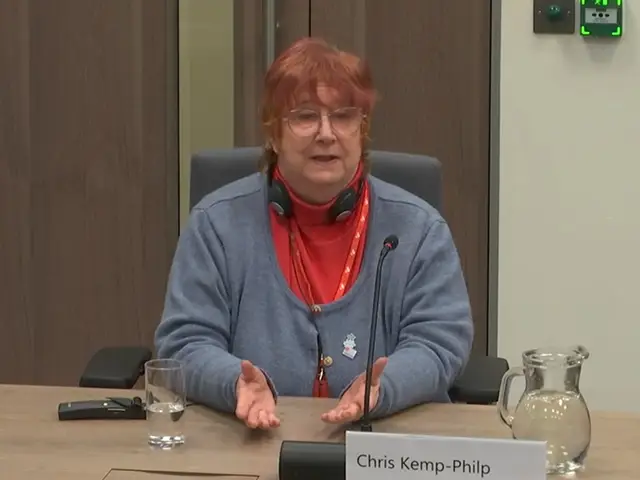
UNPAID carers are being left to “pick up the pieces” of a broken system due to a lack of respite, unsafe hospital discharges and carer’s assessments that result in “nothing at all”.
The warning came as the Senedd’s health scrutiny committee began taking evidence for an inquiry on access to support for more than 310,000 unpaid carers across Wales.
Chris Kemp-Philp, from Newport, who has been a carer for 33 years, gave up her career to become a full-time carer after her husband medically retired from the civil service in 1990.
Ms Kemp-Philp, whose husband died in April, told today’s (December 4) meeting: “I thought he’d been really badly treated… The last four months of his life were dreadful for both of us.”
She was only offered an updated carer’s needs assessment – a right under the 2014 Social Services and Wellbeing (Wales) Act – the day after her husband died.
Ms Kemp-Philp did not realise she had become a carer at first. “But, of course, having lost two incomes and to survive on a half civil service pension wasn’t great,” she said.
She told the committee how the couple “shielded” during the pandemic, saying: “For the past five years, basically, apart from going to a hospital or… a medical facility – I didn’t leave the house because if I’d have gone out, I could have brought something home.
“So, we spent five years literally avoiding people. The experience was unpleasant, I had two great-grandchildren born in that time and I only saw them on video.”
Ms Kemp-Philp said her husband was “pingponged” back and forth after unsafe discharges from hospitals in Gwent. He was put in a car by two nurses then she had to get him out on her own at the other end, with clinicians effectively telling her: it’s your problem now.
“Every time he was sent home, nobody came to help at all,” she said, explaining how she struggled to cope and her husband’s death brought a tragic sense of relief.
Judith Russell, who moved back to Wales to care for her mother 23 years ago, told Senedd Members the responsibility grew greater over the years.
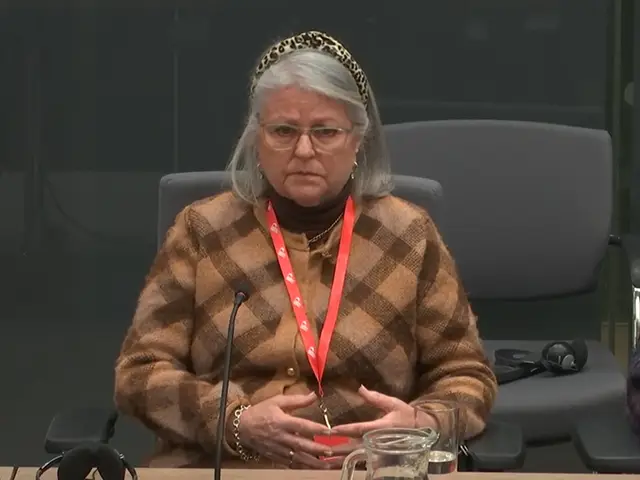
Ms Russell, whose mother died last Saturday on the eve of her 102nd birthday, told the committee: “It’s been my privilege to care for her but I wish other people—I wish there had been more actual care for her. That’s it.”
Ms Russell also cares for her husband who has Alzheimer’s disease, acts as guardian for her disabled sister and cooks every week for her sister-in-law.
“It’s quite a responsibility,” she said. “My life is taken up with caring. I didn’t actually know I was a carer, I cared for my mother because she was my mother – I looked after her, of course I did – and it wasn’t until about three years ago that I identified as a carer.”
Ms Russell warned: “All through this last 23 years, I’ve had to fight and struggle to find things out… there’s very, very little help out there.”
She said she was given a carer’s assessment earlier this year but “there was nothing they could offer me, quite frankly – nothing at all”.
Ms Russell told Senedd Members: “We had a diagnosis [but] there’s no offer of help, there are no directions to find help, somebody to point you – you should be doing this, this is available, that’s available – nothing, you’re on your own completely.”
She joined the Bridgend carers’ group which opened a door to other people grappling with the same weight of responsibility and helped navigate the system. Ms Kemp-Philp added that joining a similar peer support group saved her life.
Ann Soley, who is originally from France and has been living in Wales for eight years, described how life was turned upside down when her British husband had a stroke.
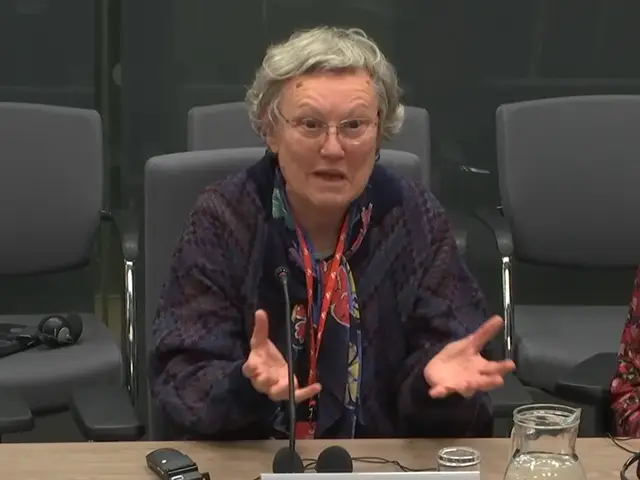
She said: “We are stressed, we are lost. A lot of carers have lost their friends, that is just unbelievable for me because I realised society is not there – there is no compassion.”
Kaye Williams, who works at Bridgend carers’ centre and is herself a carer, warned the witnesses’ experiences are commonplace across the country.
Sue Rendell, from Caernarfon, has cared for her husband who has vascular parkinsonism for nearly 14 years and was waiting for a doctor to call as she gave evidence remotely.
She told the committee: “You go in in the morning to see if he’s still breathing to be honest. We’re at the later stages of his disease and it’s physically demanding, it’s mentally demanding and it’s administratively difficult as well… it’s just very wearing.”
Ms Rendell, who was shattered after a late night caring, said she has tried to get respite but has been told there’s nothing available in Gwynedd nor Anglesey for her loved one’s needs.
She told the committee unpaid carers in Wales are “expected to pick up the pieces” but “nothing much happens” after an assessment. “Fine words butter no parsnips,” she said.
Ms Russell added: “As carers, we save the government millions… and I asked for some help this week actually. I’m 258th on the list for a hip replacement… and I asked the doctor: as a carer, couldn’t I possibly go up the list a little bit? ‘No, we’re not allowed to do that.’
“It’s the only thing I’ve ever asked for.”
Education
‘Sink or swim’: Young carer sat exam hours after 3am hospital ordeal
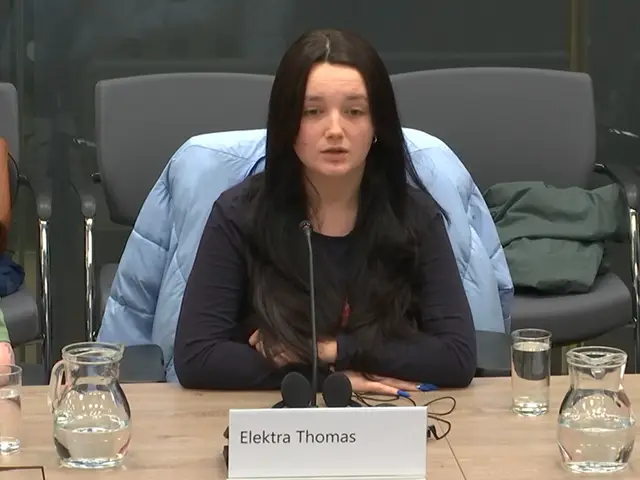
A TEENAGE carer sat a GCSE exam only hours after getting home from a hospital at 3am following a family emergency, a Senedd committee has heard.
The warning came as witnesses highlighted a “sink-or-swim” reality where children as young as three are taking on caring roles while feeling invisible to schools and social services.
Elektra Thomas, 15, who cares for her autistic, non-verbal brother and her epileptic sister, was part of a remarkable and articulate trio of teenagers who gave evidence to a new health committee inquiry on access to support for unpaid carers today (December 4).
The teenager helps her brother Blake get ready for school in the morning and helps him communicate by acting as his voice, which she has done since about three years old.
Ms Thomas told Senedd Members her sister has two children, “so I’m either handling her having a seizure, running around with her medication… or I’m looking after her kids”.
She said: “I’ve been having school assessments at the same time she’s had a seizure. I’ve been in ambulances waiting for her to get into a hospital while also studying.”
Ms Thomas explained how she is unable to focus on her schoolwork if her brother has had an overwhelming day. “I can’t focus on myself and I don’t have time for myself,” she said.
The teenager, who is from Carmarthenshire, described how she was once in hospital until 3am then sat a test – which went towards her GCSE grades – that same day.
Ms Thomas warned young carers do not have time to manage their own mental health, saying: “I didn’t have time for myself, I had time for my brother and sister and that was it.”
She said: “As a young carer who wasn’t noticed for a decade, it was pure manic: I had no coping skills, I had no support – and this has been going on since I was about three or four.”
Ffiôn-Hâf Scott, 18, from Wrexham, who is working while studying in sixth form, has similarly been a carer since she was four years old.
“I used to care for my mum and my sister,” she told the committee. “My sister used to be in a psychiatric ward, she was there for seven years.
“And I care for my mum because she’s diabetic, classed as disabled, has a long list of mental health issues, she has in the past suffered a stroke and had cancer.
“I don’t know how she’s still standing.”
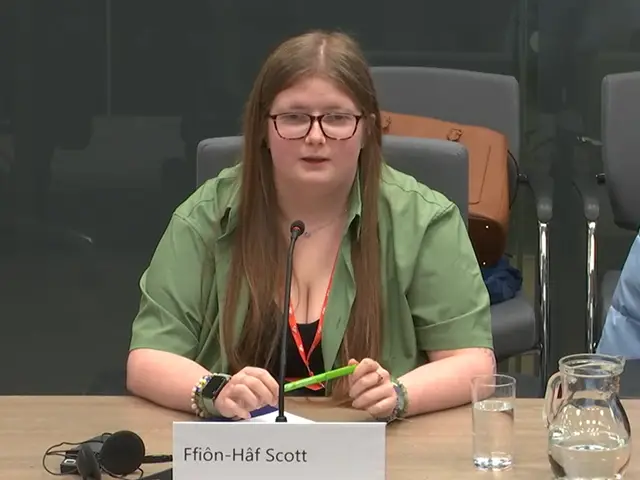
Ms Scott said: “The main challenge right now is looking after myself and learning that you actually have to keep yourself afloat… to keep looking after someone else.
“I think for a very long time I ran on nothing because of my caring role or I didn’t think about the things I needed to do for me, so respite and things like that.”
The Welsh Youth Parliament member warned a lack of support for young carers has been normalised, saying she has had to explain herself 70 different times while aged 12.
Ms Scott said: “I remember going to my teacher and saying – we had a piece of coursework – look I can’t do this right now… you’re going to have to fail me…
“Their response was just ‘well, you have too much on your plate and you need to take things off your plate’ and I was like: it’s very bold of you to stand where you’re stood and say that to me because it’s not a choice to take on the things that we do take on.”
She recalled receiving a phone call about her mum collapsing moments before a maths test and expressed concerns about the prospect of mobiles being banned in schools.
Albie Sutton, 16, a young carer from north Wales, looks after his disabled mother by doing things such as cleaning the house, budgeting and cooking for the family every day.
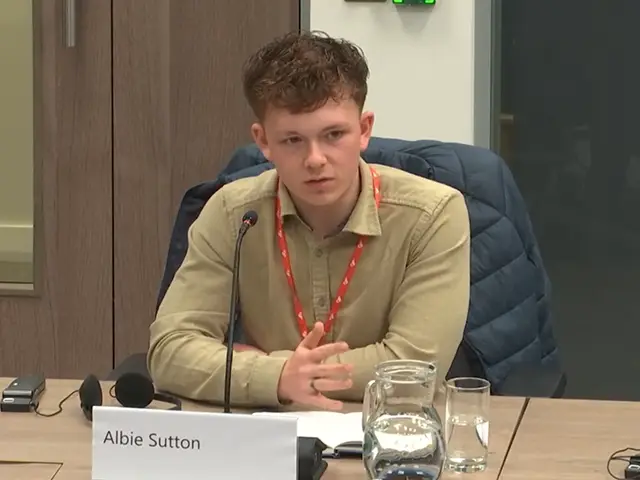
Mr Sutton said: “It’s a real struggle for her to move around the house, to even do stuff like getting dressed or moving to the toilet by herself… so I’ve got to help her.”
The teenager estimated his caring role takes up about 25 hours a week and makes it difficult for him to pursue some of his hobbies such as competing in powerlifting.
“My mind feels like a hive of bees,” he said. “There’s so many things going in and out… I get home at the end of the day and I’m like ‘oh my God, I’ve got to do this, I’ve got to do that’.”
Warning of the mental stress, he added: “It’s also really difficult for me to socialise… I feel very isolated in my caring role, especially at home. I’m always housebound, I never get the opportunity even just to go out in my local town.”
Mr Sutton told Senedd Members it plays on his mind that his younger brother may have to take on responsibility. “It’s got me debating whether I can go to university,” he said.
He called for a Wales-wide campaign to raise awareness among educators and employers of the issues young carers face and how to recognise the signs.
Ms Thomas agreed: “I’ve had multiple teachers look at me and go ‘what’s a young carer, sorry?’. I’ve had pharmacists go ‘are you sure you’re a young carer?’ and it baffles me.”
-

 Crime2 days ago
Crime2 days agoDefendant denies using Sudocrem-covered finger to assault two-month-old baby
-

 Crime1 day ago
Crime1 day agoPembroke rape investigation dropped – one suspect now facing deportation
-

 Crime6 days ago
Crime6 days agoMan denies causing baby’s injuries as police interviews read to jury
-

 News2 days ago
News2 days agoBaby C trial: Mother breaks down in tears in the witness box
-

 Crime2 days ago
Crime2 days agoLifeboat crew member forced to stand down after being assaulted at Milford pub
-

 Crime3 days ago
Crime3 days agoDefendant denies causing injuries to two-month-old baby
-

 Crime3 days ago
Crime3 days agoPembrokeshire haven master admits endangering life after speedboat collision
-

 Crime16 hours ago
Crime16 hours agoMother admits “terrible idea” to let new partner change her baby’s nappies alone


















